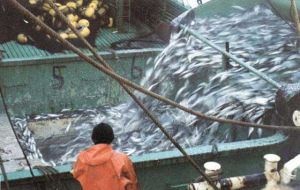MercoPress. South Atlantic News Agency
WTO moves to impose tough limit on fisheries subsidies
 No more cheap fuel for Spanish and Korean fishing vessels.
No more cheap fuel for Spanish and Korean fishing vessels. New negotiating proposals at the World Trade Organization (WTO) on Friday impose tough limits on subsidies on fisheries, a move that delighted environmentalists concerned about over-fishing.
The proposals, from Uruguay's WTO ambassador Guillermo Valles Galmes, who is chairing WTO negotiations on "rules" -- dumping, subsidies and fisheries subsidies -- do not propose a blanket ban on all subsidies to fisheries. But they list a large number of subsidies, including those for the construction of new vessels, and for operating costs of fisheries, including fuel that would be banned. Both the European Union and Korea subsidize fuel for fishing vessels. Certain subsidies in developing countries, where many poor people depend on fishing for their livelihoods, are exempted from the proposed bans, but countries benefiting from waivers must operate fishery management systems to conserve fish stocks. The proposals from Valles came in a negotiating text for the Doha round launched six years ago to boost the world economy and help developing countries grow out of poverty. WTO delegations agreed on Friday to aim to wrap up the round by the end of next year. So far negotiating texts have been issued only in the two key areas of agriculture and industry. Valles will hold the first negotiations on the basis of his text, which reflects many of the proposals in talks since the round was launched in 2001 in Doha, on Dec. 12-14. He said he would hold further talks in late January and mid February before revising the text. Valles said he did not expect anyone to agree to anything in the texts at this point. "These texts are not the end of our negotiating process but only the first step in a new phase involving further intensive discussions within the Group" he said. Oceana, which campaigns to protect the world's oceans, said the text from Valles was an important step by the WTO. "A strong fisheries subsidies agreement would be a hands-down win for the environment," said Courtney Sakai, campaign director for Oceana, which also advises the United States on fisheries subsidies. "The WTO faces challenges in tackling the issues of subsidies and over-fishing, but the potential benefits are enormous," she said. "If the Doha round fails, the oceans will be the big loser. "The texts are ambitious and balanced in all three areas they cover and they will enable negotiators to work in a more intensive manner in the coming weeks" WTO Director-General Pascal Lamy said in a statement.




Top Comments
Disclaimer & comment rulesCommenting for this story is now closed.
If you have a Facebook account, become a fan and comment on our Facebook Page!